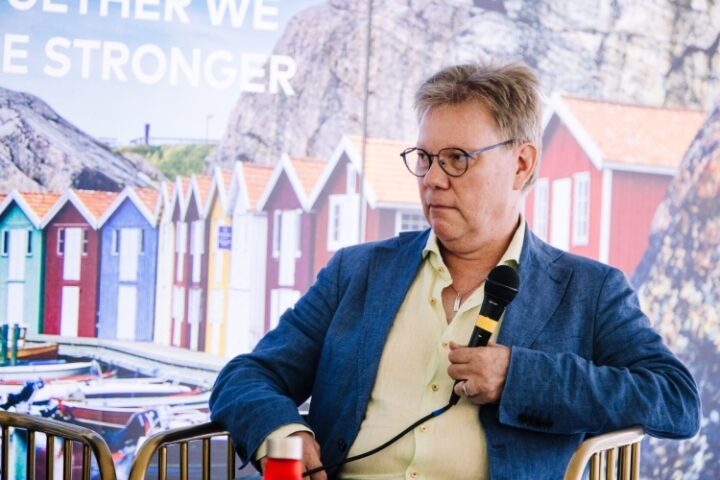DISCUSSION Successful at work and happy at the same time – is it possible?

Flexitime, balance between work and private life and a supportive team are often the keywords for people looking for a job. And yet, you may find the opposite when you go to work. Experts from Estonia and Finland discussed this topic at the Opinion Festival in Paide last weekend.
Agne Aija, Director of Central Operations RMK; Christer Haglund, Chairman of the Board of Miltton Ukraine, former Director of the Nordic Council of Ministers’ Office in Estonia; Tiina Saar-Veelmaa, happiness at work specialist and psychologist; and Jari Hakanen, Research Professor at the Finnish Institute of Occupational Health held the discussion “The Happy Place – Stuck in a Purgatory of Your Work Life” at the Opinion Festival in Paide on 11 August. The discussion was moderated by Elo Ellermaa, Public Relations Senior Consultant at Meta Advisory Group. The discussion was organised by the Nordic Council of Ministers’ Office in Estonia.
At some point, most working-age people find themselves facing the question of which factors are important for high productivity and whether creating a happy working environment is possible at all, or whether we’re all just caught in the purgatory of the work life? Is it possible to be happy and successful at the same time?
Is everything as beautiful as promised?
Before we talk about the working environment and see how happy it makes people, we must think about how to apply for a job or what kind of job advertisements are attractive in the first place. Thus, moderator Elo Ellermaa also started by pointing out that a job advertisement is like a two-way street. One is what the hiring company tells you, the other is the reality that actually awaits you. “Lately, I’ve noticed that a potential employer promises all the good things in the adverts: the best salary, the best colleagues, the best support, working environment. But can all of this really be true?” asked Ellermaa, raising an important question.
According to Jari Hakanen, job advertisements are very important because they are the first bridge or contact between the two parties. “If I, as an employee, give this and that much to the company, but the employer doesn’t give the same in return, it leads to a situation where I’m no longer loyal to them and it also creates a lack of trust,” explained Hakanen. “Therefore, the employer has to be very honest in the advertisement, about both the good and the bad.”
Agne Aija acknowledged that it’s actually impossible to promise something that cannot be guaranteed. “As a job advertisement is basically a tool used by a company to sell itself, then it also has to be attractive, because we all want to get the best people,” said Aija. “Promising the best in the advert is a way of finding the best employee.” And yet, she emphasised that direct lies shouldn’t have a place in job advertisements, because word gets around and creates a negative picture of the employer.
Christer Haglund agreed with Aija and added that comparing Finland and Estonia is difficult for him, but job advertisements certainly must include information that’s true. “When we talk about competitive salaries, for example, most people know what that amount is for one job or another,” said Haglund. “So when you promise to pay this, you must also be ready to do so.”
He also pointed out that employers could also point out their weaknesses in the job adverts, which they would like the new employee to improve. “We’re having trouble with this thing here, but come and fix it for us!”

A sober employee used to be enough, i.e. how expectations have changed
Tiina Saar-Veelmaa pointed out that flexibility has recently become very important for both parties. “This is often promised in advertisements, but it often becomes evident that the employer allows the employee to work remotely one day of the week and spend the rest of it in the office,” said Saar-Veelmaa. “So there is actually no freedom of choice.”
The freedom of choice has become particularly important after the pandemic and according to Saar-Veelmaa, it’s now obvious that job seekers prefer careers that are ‘tailor-made’. This means that the employer or manager should also separately determine what makes each employee happy at work and offer personalised motivation packages.
According to Hakanen, it’s also necessary to look at how the expectations related to employees have changed over time. “In the past, the main expectation was that an employee was sober when at work, didn’t drink alcohol when working and was more or less competent at the job, i.e. you could teach them what they had to do, but today, employers expect employees to already know everything when they start working. And I don’t think that’s right. A middle ground should be found,” explained Hakanen and added that this middle ground should be found mainly in the case of creative positions, not where specific skills are required.
Speaking of things that change with the times, Haglund pointed out how a trend started to emerge 15 years ago where, when people were recruited for a job, the CVs states that the potential employee valued family and leisure time. “This was unheard of when I started my working life,” said Haglund. “Today, it’s strange when this is not mentioned in the job application.”
https://www.norden.ee/galeriid/arvamusfestival-2023/
Are high expectations and requirements for employees justified?
One thing that often stands out when browsing job advertisements is the extremely high expectations placed on candidates, both in terms of education and previous work experience. Haglund said that he, for example, doesn’t always want everyone to be exactly the same with a lot of experience and education when he’s looking for employees. “Rather, I prefer my employees to be diverse in terms of character and education,” explained Haglund. “It’s not a good idea to discard certain people, because there are areas where robots can replace people, but this cannot be done in my line of work. So I prefer to be more general in job advertisements instead of highlighting certain very specific skills and education requirements.”
Of course, everything depends on the position that the employer is trying to fill. Aija gave the example of how they were looking for a social media specialist and received a lot more applications than expected. “The people in HR said it looked like everyone with an Instagram account had sent an application,” said Aija. “It’s true that we didn’t ask for much with this job advertisement. We said that we wanted the applicants to have some experience, but they don’t need to have a degree.”
You can certainly be more creative when setting requirements for a social media editor or a similar job, but not when you’re hiring a top specialist. “This is where the HR people always say that all we need is the right applicant,” added Aija.
However, it’s another matter whether the right person is someone who sticks to the rules or is focused on finding new solutions.
Haglund, who worked in aviation for a long time, talked about qualifications and looking for the right people and pointed out what employers look for when hiring pilots, for example. “There are only two ways in which they can do their job in the cockpit – the right way and the wrong way,” explained Haglund. “I could never become a pilot, because I’m focused on finding new solutions. A pilot cannot do that and must stick to extremely specific rules. On the other hand, these people who only see everything as black or white would struggle in a creative job.”
The panellists agreed unanimously that there is always the right applicant for each job and sometimes, having a number of degrees is not necessary at all.
Super employee or emerging burnout and boreout?
According to Saar-Veelmaa, when we criticise the work culture of a company, we should remember the words of Peeter Koppel, who said that many organisations are happy to hire a single person who does the work of two people and achieves the results of four. This thirst for results that refers to overworking almost always paves the way to burnout.

The words of Peeter Koppel sadly seem to be followed by many Estonian employees as well, as their work is more valuable to them than their lives and health. So they tend to work longer days or take on extra tasks. “I’ve noticed that employees in Estonian companies send work-related messages late at night when the working day is long over. They often don’t have enough time to have lunch, the calendars of office employees are open to everyone, so they’re not even in charge of their own time, but others can fill it with meetings and other things,” said Saar-Veelmaa and gave a negative example that can make a person look like a super employee, but also open the door to burnout.
Hakanen says that people who overwork, who sacrifice their health to work, actually are a real headache to the employer as well, as these super employees really do a lot over a short time and are useful to the employer, but this is not sustainable in the long term. This is where managers should be better role models.
In addition to burnout, being chronically bored or boreout is getting increasingly more attention as well. What does it mean? Ellermaa gave an example about herself – she worked in the same place for years and in the end, she felt like she didn’t enjoy the work anymore and had lost all interest in it.
“Every one of us can experience this boreout. I wrote about it in my study of happiness at work. It turns out that people today are more focused on a career kaleidoscope. This means that people don’t want to stick to just one specialty. For example, a pilot may want to write a book,” said Saar-Veelmaa and added that in this day and age, it’s normal that people have worked in 11 different places in their lifetime.
Who should notice that people are suffering from boreout or burnout, or in the worst case from both at the same time? The majority of the panellists agreed that this is where managers should be better role models.
“In our studies, we’ve noticed that young people are more likely to suffer from boreout,” said Hakanen. “And as it’s often accompanied by burnout, it’s a very tough nut for a manager to crack.”
Haglund added that boredom and overworking are often the results of inadequate communication. And this is where the employer needs to make more of an effort.
However, Aija felt that dealing with boreout should be the employee’s own responsibility. “Something has to change when this happens, you should look for a new job or at least try to figure out why it happened,” explained Aija.
Saar-Veelmaa has noticed that this is also a frequent concern for educational and medical processionals – they suffer from boreout and burnout develops alongside it. “The problem here is that they often don’t have much time to learn something new,” said Saar-Veelmaa.
However, when different workplaces are left aside, the panellists found that one of the causes of boredom today maybe the fact that social media and the Internet have taken over our lives and people’s ability to focus and pay attention is deteriorating.
You can listen to the panellists’ thoughts on working life on the YouTube channel of the Nordic Council of Ministers at Norden Estonia.


